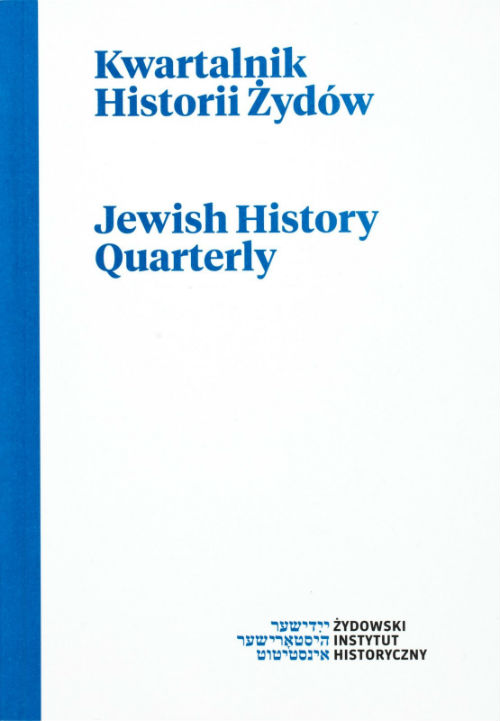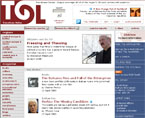
We kindly inform you that, as long as the subject affiliation of our 300.000+ articles is in progress, you might get unsufficient or no results on your third level or second level search. In this case, please broaden your search criteria.


The Department of Statistics and Records (WEiS) was one of the biggest organizational units of the Central Committee of Jews in Poland (CKŻP) and also one of those that worked for the longest period of time. Its tasks focused on three areas: the keeping of records (registration of survivors), statistics, and search for missing persons (information). The registration of survivors among Polish Jews embraced over 200,000 persons, whose personal data were kept in the Central File in Warsaw and in the form of alphabetical lists compiled in the years 1945-1947 and released in three series („Alphabetical list of Polish Jews”). At the same time, WEiS was collecting statistical materials concerning various areas of life of the Jews in Poland, including reports on the operation of local CKŻP branches, and preparing aggregate statistical reports. The WEiS search and information campaigns elicited a huge volume of correspondence concerning the missing persons and containing data about tens of thousands of people. The collections of the Jewish Historical Institute in Warsaw contain the Central File (some 280,000 cards), files and other registration lists, materials and statistical compilations as well as tens of thousand of letters from all over the world concerning the search for missing persons. In 2005, thanks to support from The United States Holocaust Memorial Museum in Washington, D.C., the WEiS archives were cleaned up and catalogued.
More...
The article deals with the criticism of the nationalist-cum-religious nature of the State of Israel, developed by the Israeli New Left organisation commonly known by the name of its press organ “Matzpen” (Hebr. compass). The development of Matzpen’s anti-Zionist concepts is shown from the birth of that organisation to Yom Kippur war (of 1973). The views of Matzpen are juxtaposed to the classic anti-Zionist document of Marxist Left that was independent of the Kremlin, namely, the resolution “Israel vs. the Arab Revolution,” passed by the U.S. Socialist Workers’ Party (SWP) in 1971. The position of Matzpen, which acknowledged Israel’s right to existence, was to become a minority view among the New Left organizations, compared to the denial of such right, represented, for example, by the aforementioned SWP. Despite its small size, Matzpen and its activists staying in the West were profoundly significant for the New Left, providing it with evidence that radical anti-Zionism free of any suspicions of anti-Semitic inspiration was possible.
More...
Brest-Litovsk (in Polish, Brześć) is one of the bigger cities in Belarus. In early modern times it was also known from its famous Jewish kehilla, which was regarded as one of the most influential ones in Lithuania. Jewish merchants from Brest Litovsk traded mostly in honey, furs, wax, wood, but also clothes and Oriental spices. The Jews of Brest-Litovsk frequently acted as tolls- and duties-lessees. Brest-Litovsk’s economic importance found its expression in the strong representation of its community on the Lithuanian Council (Vaad Lita) in the first half of the 17th century. Brest Litovsk Diet’s (sejmik) records constitute the main archival source for this article. They provide only an incomplete image of the social and ethnic relations in Lithuania in the seventeenth and the first half of the eighteenth century. In Brest Litovsk’s Diet acts are marked by a rather unfavourable attitude towards Jews. The majority of the Diet’s legislation concerns various economic matters and the enforcement of the existing laws. The gentry (szlachta) wanted Jews to pay Jewish poll tax (poglowne), but not in lump sums. Execution of Jewish debts was also frequently seen as a remedy for impoverished Brest-Litovsk voivodship, especially after the wars with Cossacks, Russia and Sweden. Confiscation of the Jewish real estate was also adopted as a protective measure. The extremely high indebtedness of the Jews led the provincial Diet to attempt to ease the tax burden for Jews. In Brest-Litovsk, we can find numerous regulations forbidding Jews from leasing tax and estates, and concerning Christian servants in Jewish houses. The gentry demanded to levy an additional tax on Jews who were employing Christian servants.
More...
August Grabski - Thy Brother's Blood Crieth unto Me from the Ground (Jan T. Gross,The Fear, Anti-Semitism in Poland after Auschwitz); August Grabski - Gross Chutzpah or Great Chutzpenik? (Norman G. Finkelstein, Wielka hucpa. O pozorowaniu antysemityzmu i fałszowaniu historii); Jan Doktór - Jeffrey L. Roth, Inheriting the Crown in Jewish Law. The Struggle for Rabbinic Compensation, Tenure, and Inheritance Right; Hanna Kozińska-Witt – Synchrone Welten. Zeitenräume jüdischer Geschichte Hrgs. Dan Diner; Katarzyna Kozyra - Emanuel Nowogródzki, Żydowska Partia Robotnicza Bund w Polsce 1915 – 1939; Hanna Kozińska-Witt – Katrin Steffen: Jüdische Polonität. Ethnizität und Nation im Spiegel der polnischsprachigen jüdischen Presse 1918-1939; Rafał Żebrowski - Klara Rosenfeld, From Lwów to Parma: A Young Woman's Escape from Nazi-Occupied Poland; Feliks Tych - Kurt I. Lewin, Przeżyłem. Saga Świętego Jura spisana w roku 1946 przez syna rabina ze Lwowa.
More...
It’s one thing to keep crashing a country’s economy, it’s another thing altogether to undermine its democracy.
More...
As soccer fans gear up for a trip to Poland, they should know a bit about one of the country’s most successful cities.
More...
EUscreen is a collection of TV shows and other audiovisual material provided by public broadcasters and archives from 20 countries.
More...
Plus, Saakashvili founds a new city and Jolie defends her Bosnian war movie against plagiarism claim. Around the Bloc is TOL's daily digest of the important, the trivial, the tragic, the weird, and the sober from its coverage region.
More...
As the eurozone crisis escalates, post-communist Europe is cooling on the euro. Should we be alarmed? Or even surprised?
More...
As these students lose their Peace Corps teacher, what will happen to the dreams that he urged them to chase?
More...
Plus, a drive to make Russian an official language in Latvia picks up steam and Serbia opens the way to restitution. Around the Bloc is TOL's daily digest of the important, the trivial, the tragic, the weird, and the sober from its coverage region.
More...
Critics call it discrimination, but city officials say the idea came from Uzbeks themselves.
More...
Plus, Belgrade compromises on Kosovo border posts and Vilnius clamps down on beggars and alms-givers. Around the Bloc is TOL's daily digest of the important, the trivial, the tragic, the weird, and the sober from its coverage region.
More...
Plus land mines continue to claim lives in Bosnia, and Serbia’s president talks up a Kosovo partition. Around the Bloc is TOL's daily digest of the important, the trivial, the tragic, the weird, and the sober from its coverage region.
More...
The leaders of the country’s first official Islamic organization keep a low profile amid an Orthodox backlash.
More...
As Russian gas gets scarcer, Europeans should expect to pay a premium for it.
More...
Is there any better proof of a nuclear comeback than Belarus’ plans for a new plant?
More...
For one entrepreneur, making the windmill was the easy part. Getting it to catch on has been another matter.
More...
Kazakhstan’s goal to become the global leader in uranium production could put strains on non-proliferation efforts.
More...